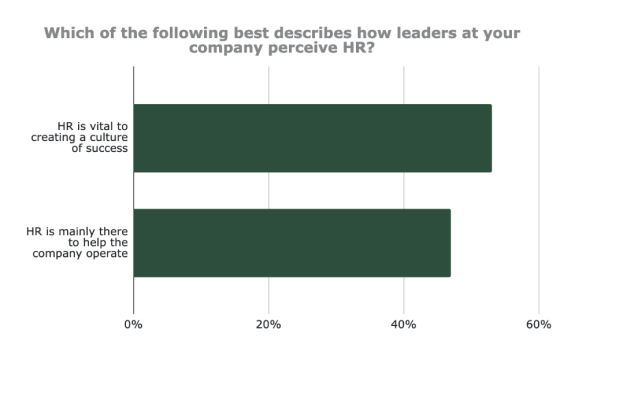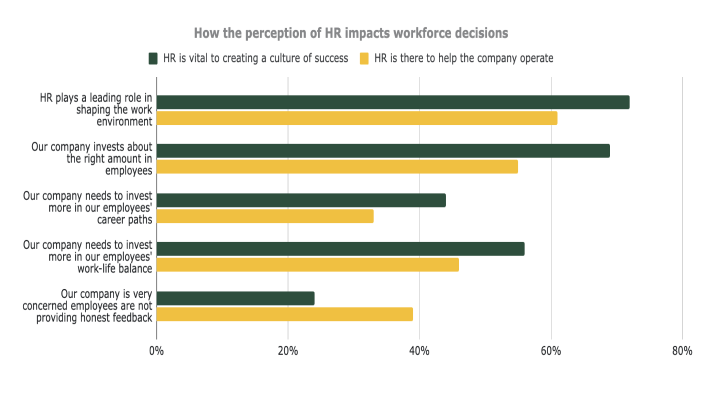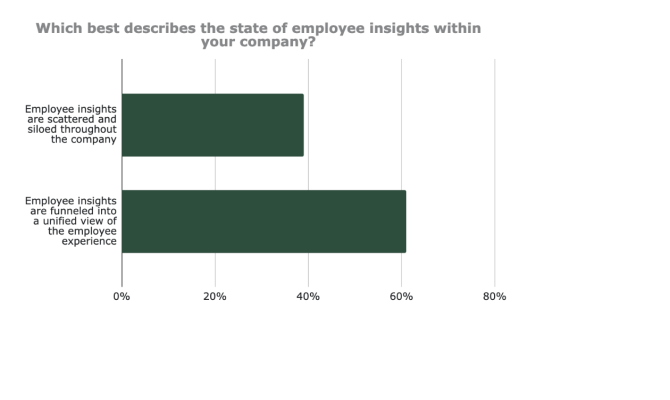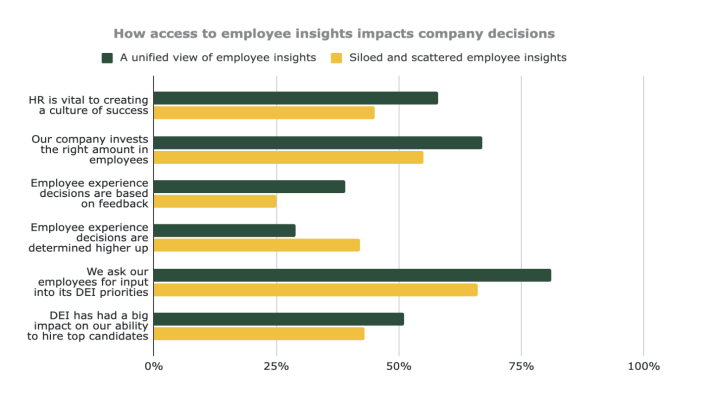In an ideal world, HR professionals are strategic partners that make a huge business impact by hiring, training, and retaining top talent. An empowered HR team can transform a company by building a world-class workforce that delivers on company goals.
However, this isn’t always the case. HR teams can be hampered by a company culture that doesn’t place enough value on people matters, and they often lack the tools and solutions that can provide insights on the employee experience. These insights are needed to make decisions and drive programs that elevate the workforce and allow employees to do their best work.
What’s the difference between teams that deliver and teams that feel hamstrung? We went to the source and asked 269 U.S. HR professionals about their roles; what they prioritize, how they make decisions, and how much of an impact they have on company goals. Here’s what we learned.
Highly impactful HR teams increasingly play a strategic role
HR has become more valued over the past few years, with COVID-19 business challenges giving HR a boost in influence. Over two-thirds (67%) of HR pros say HR plays a larger role in the employee experience since the beginning of the pandemic. The leadership role of HR is also expanding; according to a recent study, 187 of the Fortune 200 companies have a sitting, identifiable Chief Human Resources Officer or Chief People Officer. These HR leaders are often amongst the most influential people in the C-suite, as companies recognize the impact a happy and functional workforce has on company goals.
We asked HR pros whether their team plays a vital role in creating a culture of company success, or if they are perceived as operational. HR professionals are split in their responses with a little over half saying they play a vital role.

But here’s where it gets interesting: across the board, HR pros that believe their team is vital also feel they are more influential in company decisions, and that their company is investing enough—and in the right places—in the workforce.
HR pros at these companies are ahead of the game in anticipating the needs of their employees in areas that go beyond compensation. They are advocates for longer-term employee investments, such as training and development, career path, and work-life balance. And, they are more confident that their employees will provide honest feedback about the workplace.
In other words, as HR goes, so goes the health of the workforce—and the business.

The most impactful HR teams rely on employee insights
Collecting and analyzing employee insights is a crucial part of getting a true understanding of workplace health. In our study, 85% of HR pros say they provide regular employee feedback programs, and almost two-thirds (59%) feel they collect the right amount of feedback.
However, even when feedback is collected, it’s not always accessible or easy to apply. We asked HR pros to characterize how they handle employee insights—is the data scattered and siloed throughout the organization, or is there a unified view of the employee experience?
SIx out of ten HR pros say they have a unified view, while just under four out of ten say their insights are scattered. HR teams who play a leading role in decisions are even more inclined to have a unified view of data (68%).

HR pros at companies with a unified view of feedback have some distinct advantages: they are more often considered vital to the business, they are more inclined to play a leading role in workplace decisions, and they believe their companies invest the right amount in their employees.
HR pros that have a unified view of insights also report their companies are more inclined to make decisions based on employee feedback, rather than executive decisions from higher up in the organization. Their teams are also more likely to tap into feedback about important trends, such as DEI.

What HR pros can do to elevate their impact
If your HR team is striving to be more strategic and have influence over key areas of the business, there are some easy steps you can take.
Tapping into employee feedback can give your HR team the data you need to influence or educate stakeholders about what’s really happening in your company. By leading with data and insights, your team can build influence and show your value and impact.
Start by asking employees what they think about their jobs, the company, their intention to stay, their belief in leadership. Listen to their responses and use this feedback to dive into areas that need improvement. Act on feedback by creating programs that address critical areas of employee engagement, retention, and satisfaction. By beginning with insights, you can track and measure the progress you make, building a case for the value your HR efforts bring to company success.
Get all the insights we uncovered in our report, HR trends & opportunities for building a world-class workforce.
Learn more about our solutions for HR pros.
Methodology: This SurveyMonkey research was conducted between August 25 to September 5, 2023 among 269 human resource professionals. Respondents were selected from an online non-probability panel.1




